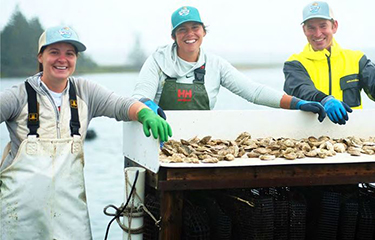NOAA backs expansion of US aquaculture industry

NOAA has released its first-ever strategic plan for expanding “a resilient aquaculture industry” in the U.S. over the next five years.
The plan was co-authored by representatives of NOAA Fisheries, the National Sea Grant College Program, and the National Centers for Coastal Ocean Science. The 20-page report states that domestic seafood is a vital resource for the United States, and that aquaculture can be effective in fighting climate change, replenishing wild stocks, and aiding in the recovery of threatened and endangered species.
“Aquaculture is a key component of our seafood systems and is one of the most climate-friendly and resource efficient ways to achieve food security, economic, and environmental restoration outcomes,” the plan states. “With limited arable land and fresh water to expand terrestrial farming, human populations will increasingly turn to coastal, marine, and Great Lakes resources, and to technologies that efficiently use space, water, and nutrients to source food and reduce climate impacts.”
In its report, NOAA outlined four goals for improving its oversight of the U.S. aquaculture sector – crafting more-efficient and -effective management processes; performing research with an eye toward improving sustainability; improving education and information exchange between U.S. aquaculture stakeholders as well as the public; and supporting the economic viability and growth of the industry.
Specifically, NOAA aims to:
Provide expertise to Congress and other stakeholders to resolve issues related to the federal regulatory framework for sustainable aquaculture and for the expansion of federal research and development programs through national legislation or other mechanisms
Explore opportunities for more accessible pathways for authorizing small scale or time-limited aquaculture activities (e.g. research, commercial trials, or restoration projects).
Work with states and federal agencies to execute directives under existing executive orders, policies, plans, and statutes to promote sustainable aquaculture as part of NOAA’s seafood portfolio.
Identify aquaculture opportunity areas to support planning for commercial aquaculture development in locations that reduce user conflict, maximize compatible uses, and minimize impacts to public trust resources through scientific analysis and public engagement.
Provide and use best available science, information, and tools (e.g., siting, water-quality and genetics models, peer-reviewed publications) for permit reviews and environmental consultations.
Foster an environment for communication between all stakeholders, and make aquaculture “a key component of a resilient seafood sector.”
The U.S. has discussed expanding its aquaculture industry for years. While it has the second-largest exclusive economic zone in the world behind only France, very little of it is used for farming purposes. America is ranked 17th globally in terms of aquaculture production.
Domestic support for aquaculture is not universal. Some in the industry see it as a threat to wild fisheries and believe fish farming practices could lead to environmental issues.
However, the report, along with the recent establishment of a bipartisan aquaculture caucus in the U.S. Congress, shows governmental backing for aquaculture is growing.
“Currently, the United States imports at least 70 percent of its seafood,” the report states. “While we continue to sustainably manage our wild-harvest fisheries, we cannot meet the increasing domestic demand for seafood through those fisheries alone. Increasing the sustainable farming of finfish, shellfish, and macroalgae is essential to increase domestic seafood supplies and provide a source of safe, nutritious, and sustainable seafood for consumers in the United States and global marketplace.”
Photo courtesy of NOAA Fisheries






Share